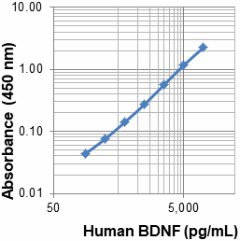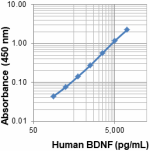- Clone
- A15062F (See other available formats)
- Regulatory Status
- RUO
- Other Names
- Brain-derived neurotrophic factor, ANON2, BLUN2
- Isotype
- Mouse IgG2b, κ
- Ave. Rating
- Submit a Review
- Product Citations
- publications

| Cat # | Size | Price | Quantity Check Availability | Save | ||
|---|---|---|---|---|---|---|
| 536804 | 100 µg | 265 CHF | ||||
Brain-derived neurotrophic factor (BDNF) is the second member of the NGF family of neurotrophic factors (neurotrophins), which includes nerve growth factor (NGF), neurotrophin-3 (NT-3), and neurotrophin-4/5 (NT-4/5). BDNF shares approximately 55% amino acid identity with other family members. The amino acid sequence of mature BDNF is identical in all mammalian species examined to date. Mature BDNF promotes the survival and differentiation of selected neuronal populations of the peripheral and central nervous systems during development. BDNF participates in axonal growth, pathfinding, and in the modulation of dendritic growth and morphology. BDNF is also a major regulator of synaptic transmission and plasticity at adult synapses in many regions of the central nervous system (CNS). High levels of expression of BDNF have been detected in the hippocampus, cerebellum, fetal eye, and placenta. BDNF binds with high affinity and specifically activates the TrkB tyrosine kinase receptor. BDNF is also associated with multiple diseases such as Schizophrenia, Rett syndrome, obsessive compulsive disorder, Huntington’s disease, eating disorders, depression, dementia and Alzheimer’s disease. For example, BDNF levels are decreased in the serum of Alzheimer’s disease patients.
Product DetailsProduct Details
- Verified Reactivity
- Human
- Antibody Type
- Monoclonal
- Host Species
- Mouse
- Immunogen
- Recombinant protein
- Formulation
- Phosphate-buffered solution, pH 7.2, containing 0.09% sodium azide and 5% HPCD
- Preparation
- The antibody was purified by affinity chromatography and conjugated with biotin under optimal conditions.
- Concentration
- 0.5 mg/ml
- Storage & Handling
- The antibody solution should be stored undiluted between 2°C and 8°C. Do not freeze.
- Application
-
ELISA Detection - Quality tested
- Recommended Usage
-
Each lot of this antibody is quality control tested by ELISA assay. For ELISA Detection applications, a concentration range of 1 - 4 µg/mL is recommended. To obtain a linear standard curve, serial dilutions of BDNF recombinant protein ranging from 156.3 to 10,000 pg/mL is recommended for each ELISA plate. It is recommended that the reagent be titrated for optimal performance for each application.
- Application Notes
-
The biotin A15062F antibody is useful as the detection antibody in a sandwich ELISA assay, when used in conjunction with purified A15062G antibody (Cat. No. 536702) as the detection antibody and Recombinant Human BDNF (ELISA Std.) (Cat. No. 759709).
Although not tested, additional species reactivity for rat, donkey, equine, porcine, and monkey are predicted based on 100% amino acid sequence conservation for this target across listed species. - RRID
-
AB_2783343 (BioLegend Cat. No. 536804)
Antigen Details
- Structure
- Noncovalently linked homodimer.
- Distribution
-
Ubiquitous with high levels in peripheral tissues including prostate, placenta, pancreas, heart, kidney, pituitary gland, lung, and testis.
- Function
- Supports the survival of sensory and sympathetic neurons, and also dopaminergic midbrain neurons.
- Interaction
- Sensory neurons, sympathetic neurons, midbrain dopaminergic neurons
- Ligand/Receptor
- TrkB
- Antigen References
-
- Baloh RH, et al. 1998. Neuron. 21:1291.
- Masure S, et al. 1999. Eur. J. Biochem. 266:892-902.
- Gardell LR, et al. 2003. Nat. Med. 9(11):1383-9.
- Honma Y, et al. 2002. Neuron. 35:267-82.
- Banerjee A, et al. 2012. PLoS One 7(11):e50098.
- Wong LE, et al. 2015. Proc. Natl. Acad. Sci. USA 112:6170-5.
- Zhang M, et al. 2016. Oncotarget. 7:3267-82.
- Gene ID
- 627 View all products for this Gene ID
- UniProt
- View information about BDNF on UniProt.org
Related Pages & Pathways
Pages
Related FAQs
- How many biotin molecules are per antibody structure?
- We don't routinely measure the number of biotins with our antibody products but the number of biotin molecules range from 3-6 molecules per antibody.
Other Formats
View All BDNF Reagents Request Custom Conjugation| Description | Clone | Applications |
|---|---|---|
| Biotin anti-human BDNF | A15062F | ELISA Detection |
Compare Data Across All Formats
This data display is provided for general comparisons between formats.
Your actual data may vary due to variations in samples, target cells, instruments and their settings, staining conditions, and other factors.
If you need assistance with selecting the best format contact our expert technical support team.

 Login / Register
Login / Register 













Follow Us